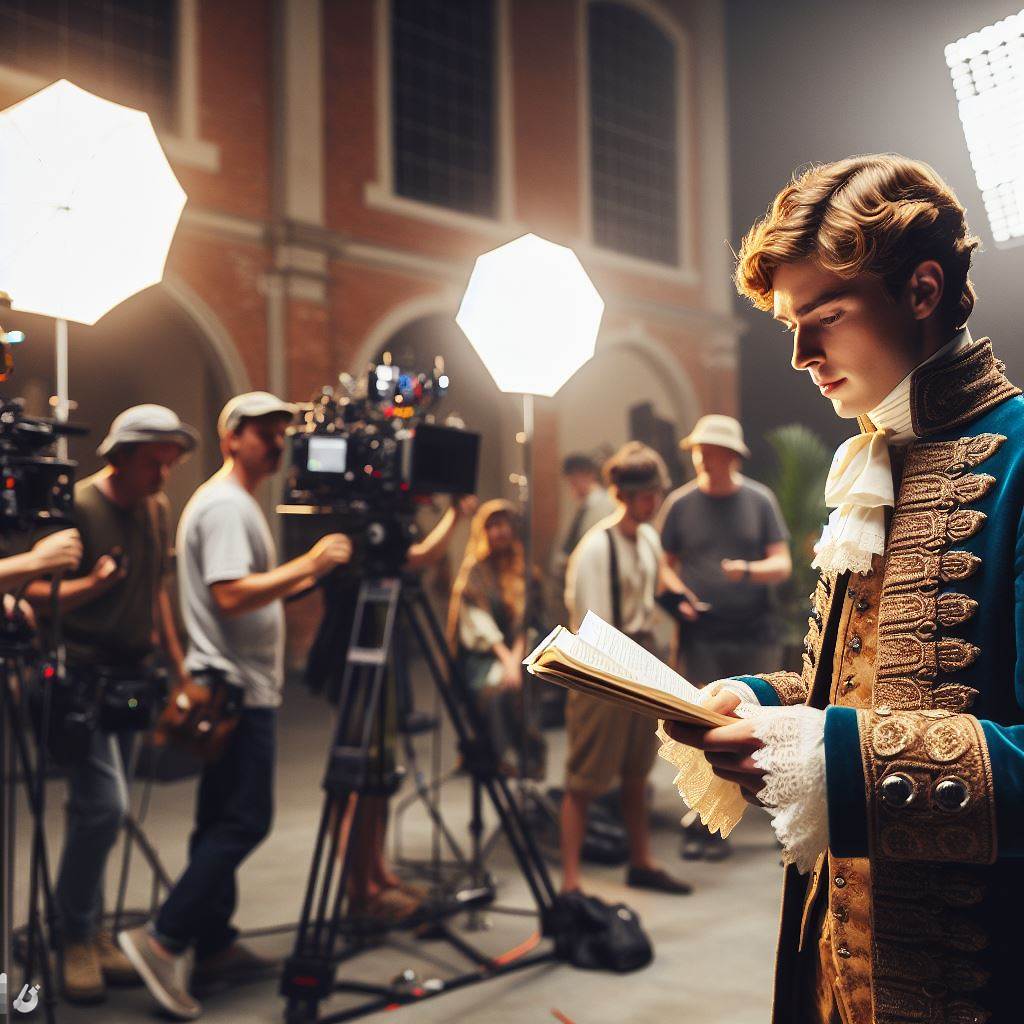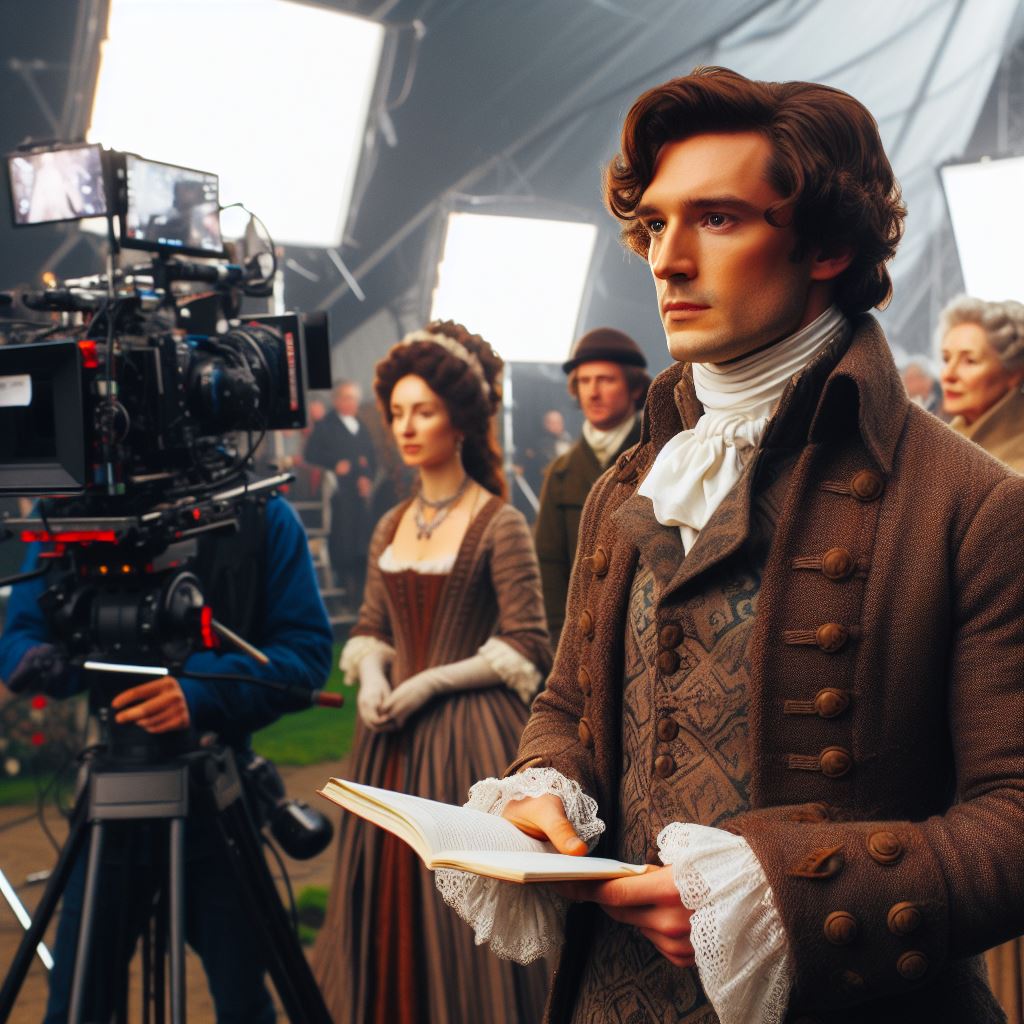Introduction
Theatre and film are two different mediums with unique skills required for actors.
Understanding these differences is crucial for actors in the UK.
This blog post will explore the varied skills needed in UK theatre and film acting.
Theatre Acting
In theatre, actors must project their voices and expressions to a live audience.
They need to have strong vocal techniques and physical presence to convey their emotions effectively.
Theatre actors must have the ability to perform on stage without any retakes or editing.
They need to have excellent timing and improvisation skills to adapt to unexpected situations.
Theatre actors often have to memorize long scripts and perform them consistently throughout the run of a play.
Film Acting
In film, actors need to be natural and subtle with their performances as the camera captures every detail.
They must be able to perform the same scene multiple times from different angles and maintain consistency.
Film actors should have a good understanding of camera angles, lighting, and framing to enhance their performances.
They need to have the ability to work with green screens and react to imaginary elements that will be added in post-production.
Film actors often have to perform emotionally intense scenes repeatedly, requiring emotional stamina.
Basically, UK theatre and film acting require different skills and approaches.
Theatre actors need to focus on projecting their voices, physical presence, and improvisation skills, while film actors need to be natural, subtle, and adaptable to camera techniques.
Personalized UK Career Consulting
Receive tailored career guidance designed just for you. Get actionable steps and expert support to boost your career in 1-3 days. Take control of your career now.
Get StartedUnderstanding these differences is crucial for actors to excel in their respective fields and deliver powerful performances.
Theatre Acting Skills
The need for projection and vocal clarity in theatre
Projection and vocal clarity are essential to ensure that the audience can hear and understand the actors.
Actors must learn to project their voice to the back of the theatre without shouting.
Vocal clarity is also important to ensure that the audience can understand what the actors are saying.
Actors can also use different vocal techniques to convey different emotions and create a more engaging performance.
Importance of stage presence and ability to engage with live audience
Stage presence and the ability to engage with a live audience are also crucial.
Actors must be able to connect with the audience and make them feel like they are a part of the performance.
They must be able to hold the audience’s attention and keep them engaged throughout the performance.
Actors can use different techniques such as eye contact, body language, and facial expressions to create a more engaging performance.
The use of physicality and body language in conveying emotions on stage
Physicality and body language are used to convey emotions on stage.
Actors must be able to use their bodies to express emotions and convey meaning.
They must be able to move around the stage with ease and grace.
Actors can also use different physical techniques such as gestures, posture, and movement to create a more engaging performance.
The necessity of memorizing long scripts and performing them in real-time
Actors must memorize long scripts and perform them in real-time.
Your Dream Job Starts with a Perfect CV
Get a tailored CV and cover letter that captures your unique strengths and stands out in your industry. Let us help you make an unforgettable first impression.
Get StartedThis requires a great deal of skill and practice.
They must be able to remember their lines and deliver them convincingly.
Actors can use different memorization techniques such as repetition, visualization, and association to help them memorize their lines.
By mastering these skills, actors can create powerful and engaging performances that captivate audiences.
Theatre acting requires a unique set of skills that are different from those required for film acting.
In theatre, actors must be able to project their voice, engage with the audience, and use their bodies to convey emotions.
They must also be able to memorize long scripts and perform them in real-time.
These skills are necessary to create a compelling and engaging performance that captivates the audience.
Read: How UK Actors Master Accents for Roles
Film Acting Skills
In the world of film acting, subtlety and naturalism are crucial.
Actors must convey emotions convincingly and realistically.
Close-ups are an important aspect of film acting.
The camera captures every nuance of an actor’s facial expressions, highlighting their ability to convey emotions effectively.
Adapting to multiple takes and non-linear shooting schedules is a significant skill in film acting.
Optimize Your LinkedIn for Success
Boost your LinkedIn profile with a professional bio, keyword-rich headline, and strategic recommendations that attract recruiters. Stand out from the crowd and get noticed.
Optimize NowActors must maintain consistency in their performances despite shooting scenes out of sequence.
Camera awareness and blocking play a vital role in film acting.
Actors must be mindful of their position and movement in relation to the camera to ensure they are captured in the best possible angles.
The Need for Subtlety and Naturalism
In film acting, subtlety and naturalism help bring characters to life.
Movements, gestures, and expressions must be grounded in reality, allowing the audience to empathize with the character’s experiences.
Through understated performances, actors create believable characters that viewers can emotionally connect with.
Subtle changes in facial expressions or body language can convey a depth of emotion that resonates with the audience.
The Importance of Close-Ups and Facial Expressions
Close-ups allow the audience to fully experience the emotions portrayed by actors.
The camera captures even the minutest facial expressions, revealing the inner thoughts and feelings of the characters.
An actor’s ability to convey emotions through facial expressions is a key aspect of film acting.
The subtle twitch of an eyebrow or a slight quiver of the lips can convey a multitude of emotions, intensifying the audience’s engagement.
Adapting to Multiple Takes and Non-Linear Shooting Schedules
In film production, scenes are often shot multiple times from different angles and perspectives.
Actors must adapt to this process, ensuring consistent performances regardless of the shooting schedule.
Performing scenes out of order can be challenging for actors, requiring them to maintain character continuity while also reflecting the character’s emotional journey accurately.
Camera Awareness and Blocking
Film actors must be aware of the camera’s presence and position.
They need to know where to direct their gaze and how their movements will be captured on-screen.
Blocking, or the planned movement and positions of actors, is meticulously crafted to create visually engaging scenes.
Actors must adjust their movements and actions according to the director’s instructions, ensuring they are always in the right place at the right time.
Essentially, film acting requires a range of skills, including subtlety, naturalism, the ability to convey emotions through facial expressions, adaptability to non-linear shooting schedules, and camera awareness.
Mastering these skills is essential for actors aiming to excel in the world of film.
Read: Breaking into Film: UK Actors’ Early Steps

Overlapping Skills
In both theatre and film acting, there are several important skills that actors need to possess.
Character Development and Portraying Different Roles
One of the key skills that actors in both theatre and film must have is the ability to develop and portray different characters.
- Actors need to delve deep into their characters, understanding their motivations, emotions, and backstory.
- They must be able to convincingly portray a range of different roles, from heroes to villains to everyday people.
- This skill is essential in order to bring characters to life and make them relatable to the audience.
Improvisation and Adaptability
Another crucial skill for actors in both theatre and film is improvisation and the ability to adapt to unforeseen circumstances.
- During a live theatre performance, unexpected situations may arise on stage, such as prop malfunctions or forgotten lines.
- Actors need to be quick thinkers and able to respond in the moment, making the necessary adjustments to keep the scene running smoothly.
- In film, changes to the script or last-minute adjustments may occur, requiring actors to adapt their performances on the spot.
Effective Communication and Collaboration
Effective communication and collaboration with directors and fellow cast members are vital skills for actors in both theatre and film.
- Actors need to be able to understand and interpret the director’s vision for a production and effectively communicate their own ideas and suggestions.
- In order to work well with others, actors must be open-minded, respectful, and willing to compromise.
- Collaboration is essential in bringing a creative vision to life on stage or screen, and actors play a crucial role in this process.
In general, actors in both theatre and film require a range of overlapping skills to succeed in their craft.
Character development and the ability to portray different roles allow actors to create compelling and relatable characters.
Improvisation and adaptability help actors navigate unforeseen circumstances that may arise during performances or filming.
Effective communication and collaboration ensure a productive and harmonious working environment for actors, directors, and cast members alike.
By honing these skills, actors can excel in both theatre and film, exploring the vast possibilities that each medium offers.
Read: The Real Life of UK Stage Actors Revealed
Delve into the Subject: UK Art Festivals: Must-Visit for Artists
You Might Also Like: Emerging Art Trends in the UK for 2024
Find Out More: Day in the Life of a UK Artist: Real Experiences
Training and Education
When it comes to aspiring theatre actors in the UK, there are various training options available for them.
These options play a crucial role in shaping actors’ skills and preparing them for the demands of the industry.
1. Drama Schools
- Drama schools are a popular choice for many aspiring theatre actors in the UK.
- These schools offer intensive training programs that cover various aspects of acting.
- Students learn fundamentals like voice control, movement, character study, and stagecraft.
- Drama schools provide a supportive environment where actors can experiment and develop their craft.
- Many respected drama schools in the UK have produced successful actors who have made a mark in the industry.
2. Workshops and Practical Experience
- Besides drama schools, workshops and practical experience are also essential for aspiring theatre actors.
- Workshops allow actors to explore different techniques, learn from experienced professionals, and expand their skill set.
- Practical experience can be gained through participating in community theatre, student productions, and fringe theatre.
- These opportunities provide actors with a chance to apply what they’ve learned and develop their stage presence.
- Networking with industry professionals and fellow actors is another valuable aspect of workshops and practical experience.
3. Specialized Film Acting Classes and Courses
- While theatre and film acting share similarities, specialized film acting classes offer specific training for the demands of the camera.
- These classes focus on subtleties and nuances that are crucial for effective on-screen performances.
- Actors learn techniques like on-camera auditions, understanding angles, and adjusting performances for different shot sizes.
- Film acting classes also cover the technical aspects of the film industry, helping actors navigate the sets and understand terminology.
- Having additional training in film acting can open up more opportunities for actors in the ever-growing field of film and television.
4. Ongoing Training and Professional Development
- Training doesn’t stop after completing drama school or specialized courses; ongoing training is essential for actors in both theatre and film.
- Actors need to constantly work on honing their skills, expanding their knowledge, and staying relevant in a competitive industry.
- Attending masterclasses, industry conferences, and seminars can provide valuable insights and networking opportunities.
- Working with different directors, exploring diverse roles, and taking on challenging projects are all part of an actor’s professional development.
- Continuing to learn and grow throughout their career ensures that actors remain versatile and adaptable in both theatre and film.
In essence, aspiring theatre actors in the UK have access to a range of training options that help them develop their skills and prepare for a career in the industry.
Drama schools, workshops, practical experience, specialized film acting classes, and ongoing training all play significant roles in shaping actors’ abilities and keeping them at the top of their game.
Read: UK Actors’ Path: From Drama School to Stardom
Conclusion
Recapping the unique skills required in UK theatre and film acting, it is evident that actors need to be versatile and adaptable.
Understanding and honing these skills is crucial for actors to succeed in both mediums.
The importance of appreciating the diverse talents and efforts of actors in both UK theatre and film cannot be overstated.
The ability of actors to adapt to various mediums showcases their versatility and dedication to their craft.
From the ability to project their voices on stage to the subtleties of facial expressions captured on screen, actors possess a range of skills that allow them to bring characters to life in different ways.
It is important for audiences to acknowledge and appreciate the hard work and talent of these individuals who entertain and inspire us.
Whether it is live performances in the intimate setting of a theater or the larger-than-life characters we see on the big screen, actors deserve our respect and admiration.
So let us continue supporting and celebrating the diverse talents in both UK theatre and film, for they are the backbone of the entertainment industry.




